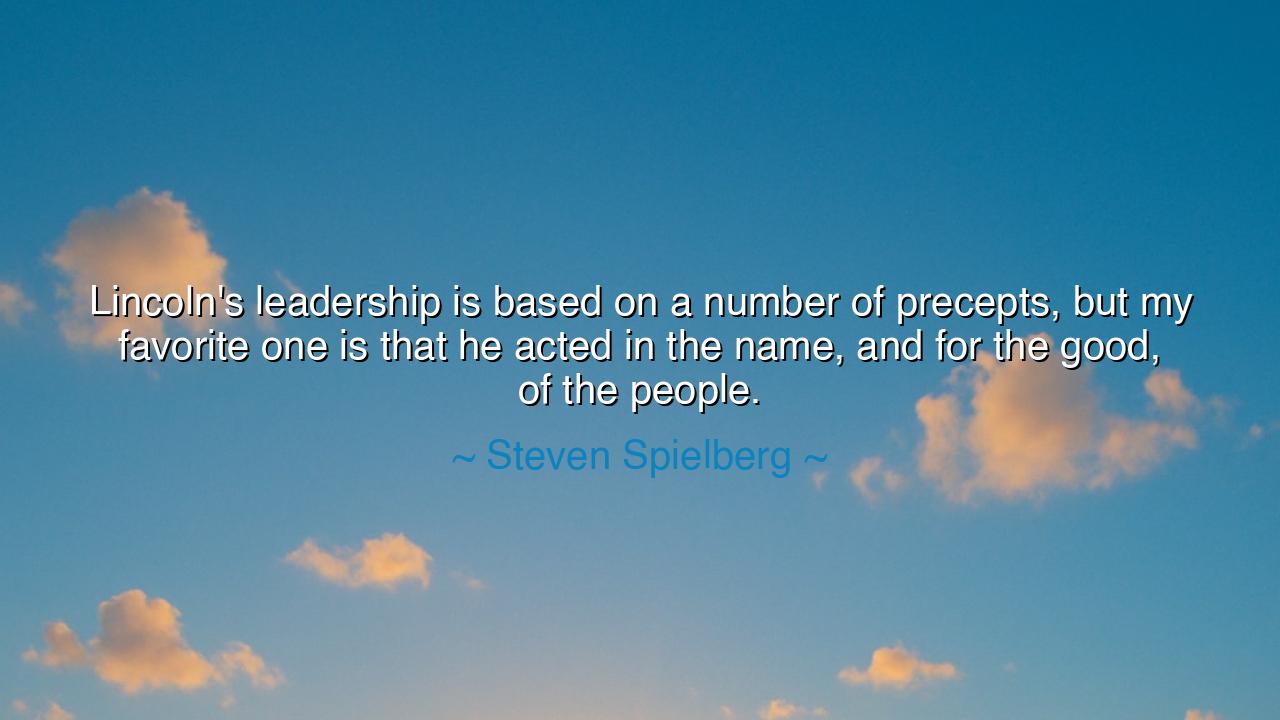
Lincoln's leadership is based on a number of precepts, but my
Lincoln's leadership is based on a number of precepts, but my favorite one is that he acted in the name, and for the good, of the people.






“Lincoln's leadership is based on a number of precepts, but my favorite one is that he acted in the name, and for the good, of the people.” – Steven Spielberg
When Steven Spielberg, the great storyteller of our time, spoke these words, he was not merely praising a man of history—he was invoking a sacred ideal. For in Abraham Lincoln, he saw more than a president or politician; he saw the embodiment of what leadership was meant to be: service, humility, and sacrifice in the name of the people. To act “in the name and for the good of the people” is to transcend the self, to let ambition bow before duty, and to make of one’s life a vessel through which justice and mercy may flow. In this, Lincoln was not only a leader of his nation, but a guardian of its soul.
The meaning of Spielberg’s reflection lies in the moral foundation of leadership. Lincoln’s greatness did not spring from power, but from purpose. He did not lead to be admired, but to do what was right. In times of division, hatred, and war, he sought unity—not for his own glory, but for the healing of his country. His leadership was guided by conscience rather than convenience, by principle rather than popularity. To act “in the name of the people” means to carry their burdens as one’s own—to feel the pain of the enslaved, the grief of the bereaved, and the hope of those who still believed in freedom’s promise. It is to stand, as Lincoln did, at the crossroads of history and say: I will not lead for myself; I will lead for them.
The origin of this ideal can be traced to Lincoln’s life itself—a story that rose from the soil of hardship and humility. Born in a log cabin, raised in poverty, Lincoln knew the struggles of ordinary men and women. He spoke their language, shared their hunger, and believed in their dignity. When he entered the presidency, he did not see himself as ruler over the people, but as servant of their trust. During the darkest years of the Civil War, when the nation seemed on the brink of ruin, he did not seek vengeance, but reconciliation. He declared that “government of the people, by the people, for the people, shall not perish from the earth.” In those words, the eternal principle of leadership was enshrined: that power exists not to elevate one man, but to uplift all humanity.
Spielberg, who studied Lincoln’s life in bringing him to the screen, understood this deeply. He once said that what drew him most to Lincoln was his moral courage—his ability to act with empathy even amid the storms of conflict. In an age when many leaders seek fame or fortune, Lincoln’s example burns like a beacon across the centuries. He showed that true strength is not in commanding obedience, but in earning trust; not in imposing will, but in awakening conscience. His leadership was not a performance, but a prayer—a steady act of faith that the human spirit, though tested by war and sorrow, could still rise toward the light.
Consider one of the most defining moments of his presidency: the signing of the Emancipation Proclamation. With one stroke of his pen, Lincoln transformed the moral landscape of his nation. Yet he did so not for applause, nor for personal legacy, but because his heart could no longer bear the weight of injustice. He knew the act would divide, would enrage, would threaten even his life—but he chose it because it was right, because it was for the good of the people. And in that moment, leadership became something higher than authority—it became sacrifice.
From the perspective of the ancients, Lincoln’s leadership mirrors the wisdom of the philosopher-kings spoken of by Plato and the servant-leaders praised in the scriptures. Such men and women lead not through domination, but through virtue and empathy. They see themselves not as owners of power, but as its stewards. To act “in the name of the people” is to remember that one’s position is borrowed, one’s title temporary, and one’s legacy measured only by how well one has served the common good. Lincoln embodied this truth so fully that even death could not silence the resonance of his example.
The lesson, therefore, is both timeless and urgent: leadership without service is hollow, and service without love is incomplete. Each of us, in our own sphere—whether as parents, teachers, mentors, or citizens—can follow Lincoln’s path. To lead is not to command, but to care; not to elevate oneself, but to elevate others. In every decision, ask as Lincoln did: Does this serve the people? Does this unite rather than divide? Does this lift the human heart? If the answer is yes, then you are leading as he led—in the name, and for the good, of the people.
So let the words of Steven Spielberg remind us of what true leadership demands. It is not charisma, not conquest, but compassion and conviction. A leader’s power fades; a leader’s heart endures. And when leadership is guided by love for the people, it becomes not just a role, but a calling—a sacred trust between humanity and hope. Like Lincoln, may we all strive to serve not for ourselves, but for the generations yet to come, carrying forward the eternal light of leadership that shines in the name of the people.






AAdministratorAdministrator
Welcome, honored guests. Please leave a comment, we will respond soon